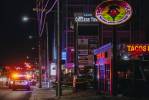COMMENTARY: Back to the 1960s
The first wave of coronavirus didn’t make the world’s biggest superpower immune to another wave of race-based tension and violence. The protest over the tragic death of George Floyd is justified. But it quickly slid into widespread rioting, which led to destruction and looting in dozens of cities across the United States, some of which took place on live broadcasts.
The protests took place during a week in which America brought us back to the 1960s: a SpaceX spaceship lifted off with two astronauts on board, while the streets were rocked by impassioned demonstrators.
Floyd’s death, his family’s suffering and the violence that followed are not good. Full stop. The question of who profits politically is cynical and unfair to the black community. But it seems that it cannot be avoided, and the prevailing belief is that the main beneficiary will be presumptive Democratic nominee Joe Biden, who will enjoy the protesters’ empathy.
Many (mostly in the media) are wishing that these events will cause President Donald Trump to lose the November election. They might be disappointed. Republican candidates have always been identified as the natural defenders of law and order. Dr. Omar Wasow of Princeton expressed that well recently, when he said, “One of the big lessons of the ’60s is (that) order has, for a long time, been a Republican issue.”
Biden, who is considered popular among black voters, described the events as a “wake-up call” for the nation. But to a large extent, he represents a party whose welfare policies, some claim, locked black Americans into dependence on government largess and perpetuated their situation.
In electoral terms, in order to win Biden needs more than mass enlistment by the black community. He also needs the suburban white vote in Michigan, Wisconsin and Pennsylvania — all purple states that voted for Trump in 2016. And in these places, there is horror at the images and strong demand for law and order.
Politics aside, why does racial tension still exist so strongly in America in 2020? Why do the police employ such brutality against black suspects? And how did the black protests deteriorate so quickly into looting and violence? Can America find a vaccine for this?
Barack Obama’s presidential win in 2008 brought great hope, maybe too great. Even during his term, interracial tensions didn’t die down and his administration saw some dire incidents. In 2014, Eric Garner was choked to death in New York while being arrested on suspicion of selling cigarettes without a license. His last words were, “I can’t breathe” — exactly the same as George Floyd’s. Garner’s death, like the death of the teenager Michael Brown from Ferguson, Missouri, triggered protests and rioting and strengthened the rise of the Black Lives Matter movement.
During the time of Bill Clinton, a president beloved by the black community, there were incidents of police abusing and killing black Americans — as in the case of Abner Louima in 1997, who was sexually abused while in police custody, the killing of Anthony Baez in 1994 and the killing of Amadou Diallo, who was shot to death by police. Riots broke out then, too.
In the 1960s, the civil rights movement, led by Martin Luther King Jr., and the Vietnam War protest movement joined forces and led then-President Lyndon Johnson to forgo another term in office in 1968. Johnson, who supported the African American community’s struggle for equal rights and enacted landmark legislation on the issue, was not deterred from calling in the National Guard to quash massive riots in Detroit (1967) and Chicago (1968). Even President George H.W. Bush sent the National Guard into Los Angeles to repress rioting that erupted after four white police officers who seriously injured Rodney King were acquitted.
Racism and protests, riots and their repression are not a product of the Trump era. No administration, Democratic or Republican, is in charge of them. The attempt to see in this unrest a sign of social disintegration under Trump is as superficial as the attempt to blame Obama for the riots in Ferguson and Baltimore. That doesn’t mean that the person in the White House is detached from the social reality during his years in office.
Racial tension is a historic wound, and all attempts to heal it thus far have failed. It seems as if the situation will never be resolved without addressing the social problems that leave them in the caboose of the social train. Abraham Lincoln’s Emancipation Proclamation, the Civil Rights Act and Voting Rights Act under Johnson, and even Obama’s health care program addressed legislative wrongs, but not the core of institutionalized racism. The black leadership has been left without tools to confront discrimination, police violence and life in poverty-stricken neighborhoods.
Boaz Bismuth is editor-in-chief of Israel Hayom, where this essay first appeared.





























